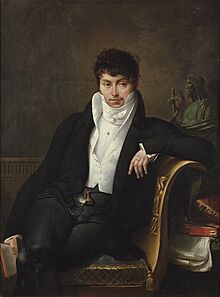Pierre Jean Georges Cabanis facts for kids
Quick facts for kids
Pierre Jean Georges Cabanis
|
|
|---|---|

Pierre Jean Georges Cabanis
|
|
| Born | 5 June 1757 Cosnac, Corrèze, France
|
| Died | 5 May 1808 (aged 50) Seraincourt, Val-d'Oise, France
|
| Nationality | French |
| Scientific career | |
| Fields | Physiology |
Pierre Jean Georges Cabanis (born June 5, 1757 – died May 5, 1808) was a French doctor who studied how the body works (a physiologist). He was also a freemason and a philosopher who believed that everything, including our thoughts, comes from physical things.
Contents
About Pierre Cabanis
Early Life and Education
Pierre Cabanis was born in Cosnac, France. His father, Jean Baptiste Cabanis, was a lawyer and farmer. From a young age, Pierre was very smart. He loved to learn, but he also liked to do things his own way. This sometimes caused problems with his teachers. He was even expelled from school!
After that, his father let him study on his own in Paris for two years. Between 1773 and 1775, Pierre traveled in Poland and Germany. When he returned to Paris, he spent a lot of time writing poetry. He even tried to win a prize from the French Academy for his translation of a part of Homer's Iliad. He didn't win, but his friends encouraged him to keep writing.
Choosing a Career
Pierre's father wanted him to choose a more stable job. So, Pierre decided to study medicine. In 1789, he wrote a book called Observations on Hospitals. This book helped him get a job managing hospitals in Paris.
In 1795, he became a professor of hygiene (the study of health and cleanliness) at a medical school in Paris. Later, in 1799, he taught about legal medicine and the history of medicine.
Interests and Friends
Pierre Cabanis didn't practice as a regular doctor much. He was more interested in the deeper questions of how the body and mind work. He was very close friends with Honoré Mirabeau, a famous French politician. Cabanis even helped Mirabeau with his writings on public education. When Mirabeau was sick, Cabanis was his doctor.
Role in the French Revolution
Cabanis was very excited about the French Revolution. He became a member of the Council of Five Hundred, which was a part of the French government. Later, he joined the Senate. He even made a motion that led to the end of the Directory, another part of the government at the time.
However, his political career was short. He didn't agree with the policies of Napoleon Bonaparte, who became a powerful leader in France. Cabanis refused any job offers from Napoleon's government. He passed away in Meulan, France.
His body is buried in the Pantheon, a famous building in Paris where many important French people are laid to rest. His heart is buried in Auteuil Cemetery in Paris.
Cabanis's Ideas
The Mind and Body Connection
One of Cabanis's most important works is Rapports du physique et du moral de l'homme (On the relations between the physical and moral aspects of man). He wrote this book in 1802. In it, he explored how our physical body and our thoughts and feelings are connected.
Cabanis believed that our thoughts and feelings come from our body, especially our nervous system. He thought that our ability to feel things (sensibility) is the most basic part of life and the lowest level of intelligence. He suggested that all our thinking processes develop from this sensibility.
He famously said that the soul isn't a separate thing, but rather a function of the brain. He compared the brain to the stomach. Just as the stomach digests food, the brain receives information and "digests" it. He believed that thought is like an "organic secretion" of the brain.
Life and Nature
Even though Cabanis believed thoughts came from the brain, he also had another idea. He thought that life itself was something extra added to an organism. He believed there was a powerful, living force he called Nature. He thought this force had both intelligence and will. He even suggested that this living power forms our "ego" (our sense of self), which he believed was not physical and could live forever. Cabanis felt that these ideas didn't go against his earlier theories.
The famous philosopher Arthur Schopenhauer really liked Cabanis's work and called it "excellent."
Cabanis was also a member of a masonic group called Les Neuf Sœurs starting in 1778. In 1786, he became an international member of the American Philosophical Society in Philadelphia.
Ideas on Evolution
Cabanis was one of the early thinkers about evolution. He believed that life could start on its own (spontaneous generation). He also thought that different species changed over time. He suggested that these changes happened through "chance mutations" (random changes) and also through "man's experimental attempts." These changes would then affect how traits were passed down.
He influenced the work of Jean-Baptiste Lamarck, another important thinker about evolution. Lamarck even mentioned Cabanis in his book Philosophie Zoologique. Cabanis also supported the idea of the inheritance of acquired characteristics. This means he thought that traits an animal gained during its life could be passed on to its children. He also developed his own ideas about instinct.
Cabanis even made a statement that showed he understood a basic idea of natural selection. He suggested that species that survived "had successively to bend and conform to sequences of circumstances." This meant that new species would appear that were "better adjusted to the new order of things."
 | Janet Taylor Pickett |
 | Synthia Saint James |
 | Howardena Pindell |
 | Faith Ringgold |

